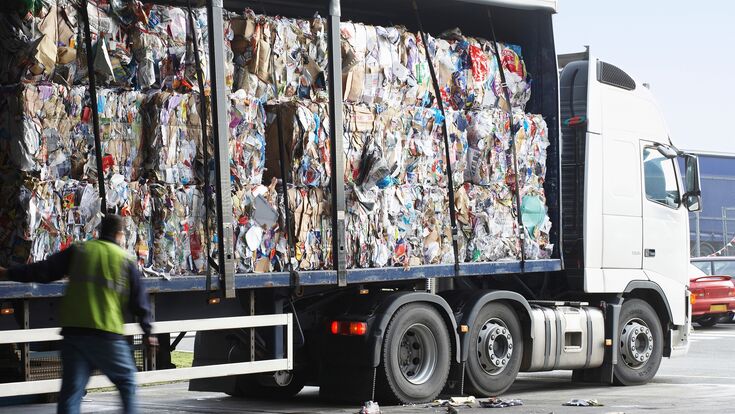Waste transports : European Council ready to start negotiations on waste shipment rules

Banning waste exports is becoming more and more likely for EU member states. Now the European Council announced that it has adopted its negotiating mandate to open talks with the European Parliament on a proposal to bring EU legislation on cross-border waste shipments up to date. The objective is to ensure that international shipments of waste don't pose a threat to human health and the environment and to foster the use of waste as a resource in a circular economy. The European Parliament has already called for stricter rules for waste shipment back in January 2023.
The proposal to revise the Waste Shipment Regulation aims to
- guarantee that waste is only shipped to destinations where it will be properly treated
- modernise, harmonise and digitise procedures for shipments within the EU and promote waste shipments destined for recycling
- fight illegal waste shipments, which fall through the cracks due to diverging procedures and lack of control.
In its negotiating mandate, the Council agreed to the broad objectives of the new proposal. In particular, it agreed to ban exports of waste for disposal in another Member State except under strict conditions and to ban shipments of non-hazardous waste to non-OECD countries unless they give their explicit consent and can demonstrate that they will treat the waste in an environmentally sound manner.
Stay connected - subscribe to our newsletters!
The Council made several modifications to the original proposal. Such as "more realistic timelines in the procedure of prior written notification and consent, 'PIC'", as it says in a statement. Exporters must notify and receive written consent from the countries of dispatch, destination and transit prior to export.
In the case of so-called 'green-listed waste', for which a less stringent procedure applies, the Council has included stricter requirements to improve control of these waste streams and a take-back procedure in case their shipment cannot be completed as intended.
Regarding take-back obligations in the specific case of illegal shipments, the Council added the possibility to make alternative arrangements for the recovery or disposal of the waste instead of applying a take-back procedure.
We cannot continue to export our waste problems. This regulation will give us better guarantees that the waste we send abroad doesn’t harm health and the environment. Inside the EU, it will encourage the use of waste as a secondary material so that waste can bring positive economic value to us and contribute to a more circular economy.Romina Pourmokhtari, Swedish Minister for Climate and the Environment
Digitised procedures
Streamlining and digitising the notification, consent and information procedures for intra-EU shipments is also a key element. In order to ensure clarity and consistency throughout the Regulation, the Council has introduced several amendments concerning the electronic exchange of documentation system. Some notification deadlines should, according to the Council, be extended in order to give the competent authorities sufficient time to receive and assess the information and documentation.
Exports outside the EU
Concerning shipments outside EU Member States, the Council has reached an agreement that waste management facilities in the country of destination should be audited by independent bodies every three years. The audits would demonstrate that the facilities treat waste in an environmentally sound manner, and operators would only be allowed to export waste to these facilities if this was the case.
Member states proposed the creation of a register, maintained by the Commission, containing information on facilities that have been audited, to help waste exporters prepare for shipments. But exporters would remain responsible for ensuring that their exports are environmentally sound. The Council also clarified which waste, in particular unlisted waste, can be exported and how.
To prevent waste from being smuggled as used goods, the Council agreed to empower the Commission to adopt implementing acts laying down criteria for distinguishing used goods from waste. The Commission would also be able to harmonise the classification of waste at EU level, in particular by adopting delegated acts to set criteria, such as contamination thresholds for waste, to determine how harmful it is and to avoid misunderstandings as to whether it should be subject to the notification procedure.
Illegal waste transports
Waste trafficking still is a big problem the EU wants to tackle. By agreeing to the Commission's proposal to set up a Waste Shipment Enforcement Group, the Council facilitates and improves cooperation and coordination between Member States to prevent and detect illegal shipments.
Member States agreed to authorise the Commission to carry out investigative and coordinating actions in relation to illegal shipments. The aim of these actions would be to support and complement Member States' enforcement activities, but not to interfere with criminal prosecutions or national judicial proceedings.
With respect to penalties for infringements, the Council added flexibility for Member States to adapt the provisions on fines to their different national legal systems.
Regarding the timeframe, the Council proposes that the new conditions for the export of waste should apply after three years in order to allow more time for preparation. The rules relating to the Commission would apply immediately, while the main date of application of the new Regulation should be 24 months after its entry into force.
As a next step, the Council will start negotiations with the European Parliament to come to an agreement on the final shape of the legislation. As soon as a provisional agreement is reached, the final text would have to be formally adopted by both institutions.
